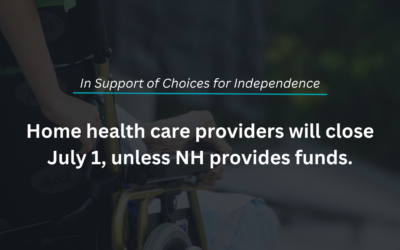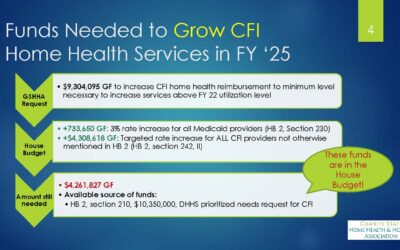Source: Concord Monitor
Gina Balkus lives in Nashua and is CEO of the Granite State Home Health & Hospice Association.
New Hampshire is often ranked among the healthiest in the nation, but that is changing. Despite having excellent health care services, many Granite Staters cannot access care when they need it. We have a systemic care crisis caused by the domino effect of chronic Medicaid underfunding.
It starts in the home with New Hampshire’s Choices for Independence (CFI) program. CFI enables low-income older adults and those with disabilities to live at home when they qualify for a nursing home. Home care agencies provide personal care, home health aides, nurses, and homemakers so CFI enrollees can remain independent.
Helping people get showered, reminding them to take medications, assessing medical conditions, and ensuring they have food in the fridge and clean sheets and clothes — these cost-effective services help keep vulnerable individuals out of nursing homes and hospitals.
Unfortunately, Choices for Independence has been underfunded for years, racking up a $153 million structural deficit since 2011. Inadequate reimbursement means that home care agencies cannot pay competitive wages, not to mention cover rising costs such as mileage, supervision, training, and benefits. The direct care workforce has been decimated.
Current CFI enrollees are lucky if they get two-thirds of the services they need. New enrollees aren’t receiving any services. (You can view their stories at CareParadox.org.)
Several CFI providers that care for hundreds of people, Ascentria and Waypoint, may soon end CFI services because they can no longer subsidize the financial losses. Other home care agencies can’t take on all these clients.
What happens to those fragile individuals who miss out on their home care? They are likely referred to a skilled nursing facility, but the story is similar. Low Medicaid payments and COVID burnout have left nursing homes struggling to staff beds. The lengths of nursing home wait lists are staggering.
Without home support, a sudden fall, worsening chronic condition, or missed medications can result in hospitalization. It could be a long stay since hospitals cannot discharge patients if there is no care at home or no available nursing home bed. Some patients are stuck in hospitals for weeks and months.
The underfunding of state programs results in access problems for all Granite Staters, not just those on CFI and Medicaid. When home care agencies don’t have enough direct care staff, it impacts everybody who needs this care. When nursing homes close units, it cuts off access for all. When hospital patients can’t be discharged, beds aren’t open for today’s emergencies or scheduled procedures. Hip surgeries are delayed. Cardiac procedures put off. Ambulances detoured to other facilities. The situation is desperate.
The Legislature, forewarned for years, has simply bandaged Medicaid and CFI with small rate increases here and there. That’s not a cure. This year, the House took a step in the right direction by targeting some funds for CFI, nursing homes, and other essential providers, but it’s not enough.
The Senate must acknowledge the crisis and take further action to solve it. New Hampshire is an affluent state with a bountiful Rainy Day Fund. We should strive to maintain a high-quality healthcare system.
I encourage everyone to call your state senators. Urge them to fully fund providers’ requested rate increases on July 1, 2023, to stabilize and grow programs like Choices for Independence. It’s time to stand the dominoes back up.


